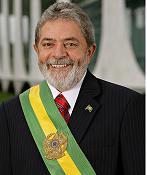Lula
Brazil's Lula most influential, Time magazine says
 Brazilian President Luiz Inacio Lula da Silva is the most influential person in the world, according to Time magazine, which on Thursday released a list on which also appear former U.S. President Bill Clinton and extravagant pop singer Lady Gaga.
Brazilian President Luiz Inacio Lula da Silva is the most influential person in the world, according to Time magazine, which on Thursday released a list on which also appear former U.S. President Bill Clinton and extravagant pop singer Lady Gaga.
Time's 7th annual list of the 100 Most Influential People in the World, released Thursday online, places the 64-year-old Lula - who became Brazil's president in 2003 and will leave office next January - in the No. 1 spot among world leaders.
In a profile of the Brazilian leader, filmmaker Michael Moore called Lula "a genuine son of Latin America's working class - in fact, a founding member of the Workers' Party - who'd once been jailed for leading a strike."
Moore went on to praise Lula for trying "to propel Brazil into the First World with government social programs like Fome Zero (Zero Starvation), designed to end hunger, and with plans to improve the education available to members of Brazil's working class."
Following Lula, the magazine listed the president of Taiwanese personal computer manufacturer Acer, J.T. Wang; the chairman of the U.S. Joint Chiefs of Staff, Adm. Mike Mullen; President Barack Obama and House Speaker Nancy Pelosi.
Other key leaders on the list are former Alaska Gov. Sarah Palin, International Monetary Fund chief Dominique Strauss-Kahn, Japanese Prime Minister Yukio Hatoyama and Turkish Premier Recep Tayyip Erdogan.
Time selected Bill Clinton, 63, to head the "heroes" section on the varied list for his work as U.N. envoy to earthquake-stricken Haiti.
Also making the list in the "thinkers" category are prestigious Anglo-Iraqi architect Zaha Hadid, Apple CEO Steve Jobs and former U.S. Federal Reserve Chairman Paul Volcker, among others.
Rounding out that category is Sonia Sotomayor, 55, who last year was nominated by Obama to the U.S. Supreme Court, thus - after she was confirmed - becoming the first Hispanic woman to serve on the high court.
Luiz Inácio Lula da Silva
By Michael Moore
When Brazilians first elected Luiz Inácio Lula da Silva President in 2002, the country's robber barons nervously checked the fuel gauges on their private jets. They had turned Brazil into one of the most inequitable places on earth, and now it looked like payback time. Lula, 64, was a genuine son of Latin America's working class — in fact, a founding member of the Workers' Party — who'd once been jailed for leading a strike.
By the time Lula finally won the presidency, after three failed attempts, he was a familiar figure in Brazilian national life. But what led him to politics in the first place? Was it his personal knowledge of how hard many Brazilians must work just to get by? Being forced to leave school after fifth grade to support his family? Working as a shoeshine boy? Losing part of a finger in a factory accident?
No, it was when, at age 25, he watched his wife Maria die during the eighth month of her pregnancy, along with their child, because they couldn't afford decent medical care.
There's a lesson here for the world's billionaires: let people have good health care, and they'll cause much less trouble for you.
And here's a lesson for the rest of us: the great irony of Lula's presidency — he was elected to a second term in 2006 and will serve through this year — is that even as he tries to propel Brazil into the First World with government social programs like Fome Zero (Zero Starvation), designed to end hunger, and with plans to improve the education available to members of Brazil's working class, the U.S. looks more like the old Third World every day.
What Lula wants for Brazil is what we used to call the American Dream. We in the U.S., by contrast, where the richest 1% now own more financial wealth than the bottom 95% combined, are living in a society that is fast becoming more like Brazil.
(Published by EFE and Time Magazine – April 29, 2010)